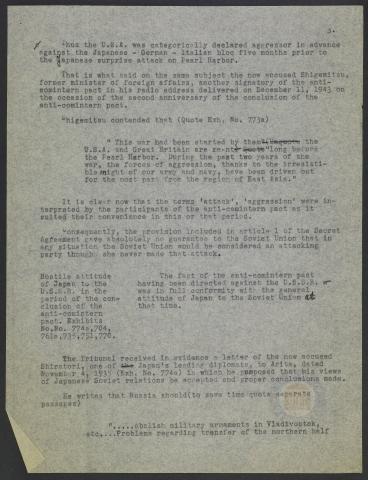
Page 4
| Parent | Transferring materials concerning The Tripartite Pact and The Anti-Comintern Pact |
|---|---|
| Date | 19 September 1947 |
| Language | English |
| Collection | Tavenner Papers & IMTFE Official Records |
| Box | Box 5 |
| Folder | General Memoranda and Reports from September 1947 |
| Repository | University of Virginia Law Library |
Thus the U.S.A. was categorically declared aggressor in advance against the Japanese ?Çô German ?Çô Italian bloc five months prior to the Japanese surprise attack on Pearl Harbor. That is what is said on the same subject the now accused Shigemitsu, former minister of foreign affairs, another signatory of the anti-comintern pact in his radio address delivered on December 11, 1943 on the occasion of the second anniversary of the conclusion of the anti-comintern pact. Shigemitsu contended that (Quote Exh, No. 773a) ?Ç£This war had been started by them the U.S.A. and the Great Britain are meant long before the Pearl Harbor. During the past two years of the war, the forces of aggression, thanks to the irresistible might of our army and navy, have been driven out for the most part from the region of East Asia.?Ç¥ It is clear now that the terms ?Çÿattack?ÇÖ, ?Çÿaggression?ÇÖ were interpreted by the participation of the anti-comintern pact as it suited t heir convenience in this or that period. Consequently, the provision included in article 1 of the Secret Agreement gave absolutely no guarantee to the Soviet Union that in any situation the Soviet Union would be considered an attacking party though she never made that attack. Hostile attitude of Japan to the U.S.S.R. in the period of the conclusion of the anti-comintern pact. Exhibits No.No. 774a, 704, 761a, 735, 751, 770. The fact of the anti-comintern pact having been directed against the U.S.S.R. was in full conformity with the general attitude of Japan to the Soviet Union at that time. The Tribunal received in evidence a letter of the now accused Shiratori, one of Japan?ÇÖs leading diplomats, to Arita, dated November 4, 1935 (Exh. No. 774a) in which he proposed that his views of Japanese Soviet relations be accepted and proper conclusions made. He writes that Russia should (to save time quote separate passages) ?Ç£. . . . . abolish military armaments in Vladivostok, etc. . . .Problems regarding transfer of the northern half
